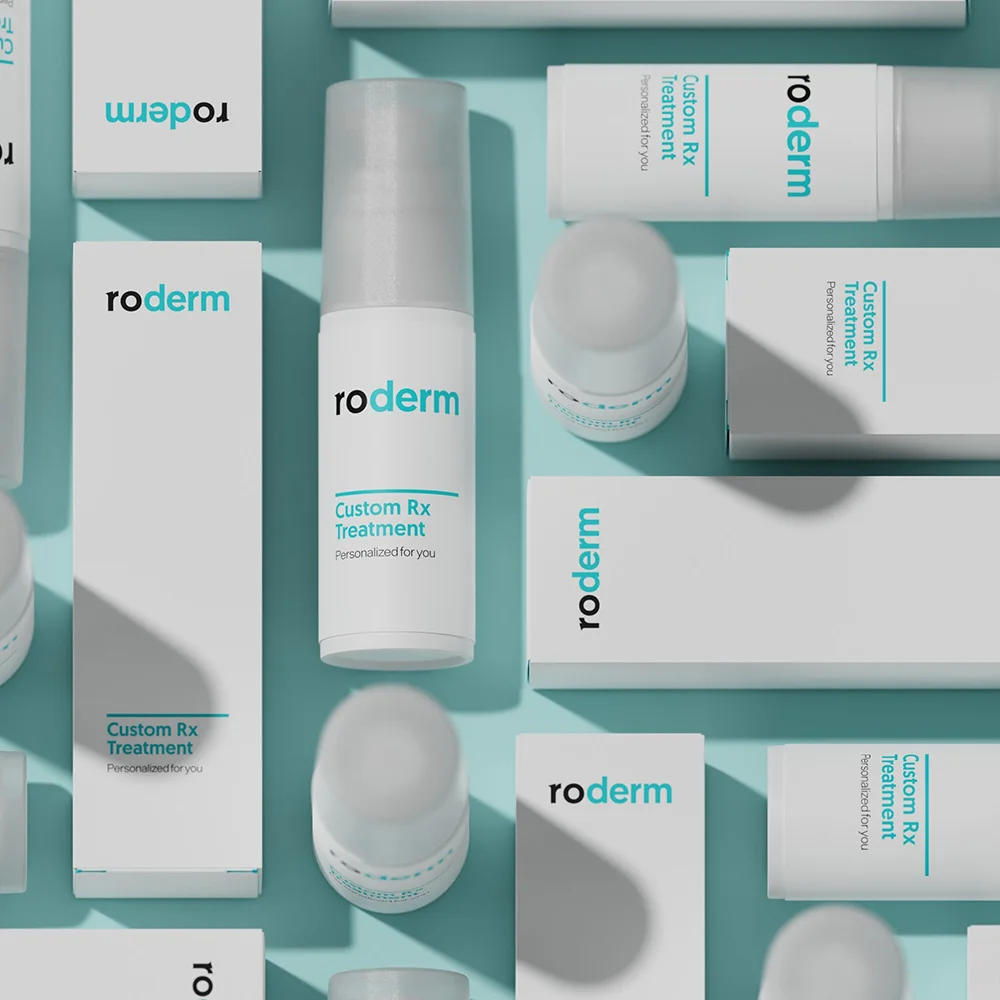Here's what we'll cover
Here's what we'll cover
Not only is skin your body's largest and most visible organ, it's also your first line of defense against infection and other environmental threats. When our skin barrier is disrupted, it can cause skin conditions like eczema, psoriasis, and dermatitis (Kim, 2018).
Even more, a healthy skin barrier is important for maintaining moisture levels, preventing inflammation, and keeping skin looking youthful. So, how can you keep it healthy?
Here's what you need to know about your skin's barrier—including how to identify when it's damaged and ways to restore it to optimal health.
What is your skin barrier?
Also called the stratum corneum or epidermis, the skin barrier is your outermost layer of skin. As the name suggests, this layer acts as a barrier or shield, protecting the body from external factors like bacteria and environmental pollutants (Murphrey, 2021).
Your skin barrier is primarily made up of two key components: keratin and lipids. Keratin is a protein that helps keep the skin strong and resilient. Lipids are fats that help lock in moisture and prevent water loss. Together, these elements create a physical barrier that protects the skin from external stressors (van Smeden, 2016).
The skin barrier has several important functions, including (Kanwar, 2018):
Protecting the body from bacteria, viruses, and other harmful substances
Keeping your body hydrated by preventing water loss
What causes a damaged skin barrier?
Your skin barrier continually renews itself, a function where old cells die and new ones take their place. This natural process (called skin degeneration and regeneration or epidermal desquamation) is similar to exfoliation in that it removes dead cells to keep skin looking smooth and radiant (Kamolz, 2015; Has, 2018).
Our bodies naturally shed and replace dead skin cells, but sometimes this process is disrupted. Many things can contribute to a damaged skin barrier, but fortunately, most can be avoided with a proper skincare routine and the right products. Common factors that cause skin damage include:
Excessive washing: Washing your skin too often can strip away the natural oils that protect the skin barrier. This can leave skin feeling dry and irritated.
Harsh products: Using harsh soaps, detergents, and cleaners can damage the skin barrier, especially if you have sensitive skin.
Hot showers: They feel pretty good, but taking long hot showers strips away natural oils that protect your skin barrier.
Dry climate: Living in an arid climate can cause skin to dry and crack. Using a humidifier indoors can help add moisture to the air.
Exposure to sunlight: The sun’s powerful ultraviolet rays can damage cell DNA, which can increase the risk of certain skin conditions and cancers.
Dehydration: Drinking enough water is important for overall health, and to keep skin hydrated.
Signs of a damaged skin barrier
When our skin regeneration process is disrupted, the skin barrier can no longer protect the body effectively. This can lead to a number of symptoms or skin problems including:
Dry, cracked skin
Itchiness and irritation
redness, swelling, and pain
Blisters
Infection
10 tips for restoring skin
Even with a regimented skincare routine, our skin isn't always as healthy as it should be. Fortunately, there are several skin barrier repair products and lifestyle changes you can make to give your skin a boost.
1. Use a gentle cleanser
Contrary to popular belief, washing your face with harsh cleansers isn't necessary for keeping skin clean. In fact, washing your face too often strips away the natural oils that keep our skin barrier healthy.
Avoid using harsh soaps and detergents. Instead, opt for a gentle, fragrance-free cleanser to avoid irritating skin. Skincare products with ingredients like ceramide, glycerin, and hyaluronic acid all help replenish the skin’s natural moisture barrier to restore hydration (Gade, 2022).
2. Try a hydrating moisturizer
Research has found that dry skin results from a water content of less than 10% in the skin barrier. Using hydrating topical products can help maintain optimal water content in the skin and keeps your skin barrier functioning the way it should (Purnamawati, 2017; Harwood, 2021).
After cleansing your skin, apply moisturizing lotion to lock in nutrients. Avoid using traditional soaps as these often have a different pH than our skin, which can create an imbalance that leads to dryness and irritation (Gade, 2022).
3. Avoid long hot showers
Excess heat strips away valuable nutrients and natural oils that protect our skin and can set off a chain reaction leading to a damaged skin barrier.
Keep hot showers short, or try using lukewarm water. Avoid hanging out too long in extra high-temperature environments like hot tubs and saunas as these also can disturb your skin barrier (Gade, 2022).
4. Exfoliate––gently
While exfoliation sessions can be beneficial, scrubbing skin too vigorously can damage it. The same goes for over-exfoliation; once or twice per week is usually more than enough to keep skin happy. Try using a softer exfoliating product or tool (like a loofah) to avoid irritating skin.
5. Wear sunscreen
Not only does regularly applying sunscreen help prevent skin cancer, it also protects our cells from damage caused by UV rays. Before going outside, slather on sunscreen with SPF 30 or higher (and reapply often) (AAD, n.d.).
6. Drink plenty of water
Water is essential for every bodily function, which includes keeping skin hydrated. The 8x8 rule (eight glasses of water per day for adults) is a good guideline for adequate water intake, although individual needs may vary based on age, gender, race, and other factors (Armstrong, 2018).
7. Eat foods with omega-3 fatty acids
Diet also plays a role in skin health. Incorporating foods that are rich in omega-3s fatty acids—like salmon, flaxseed, chia seeds, and walnuts—may reduce inflammation and maintain skin health (Thomsen, 2020).
8. Use a humidifier
Arid climates and seasonal changes can affect the rate your skin loses water, which leads to dryness and cracked skin. When air is too dry, it draws out moisture and beneficial oils from the skin. Using a humidifier adds moisture back into the air, which may help keep your skin happy (Mieremet, 2019).
9. Treat existing skin conditions
It's essential to get proper care for underlying skin conditions, like atopic dermatitis, as these can worsen, lead to infection, or cause other complications if left untreated (Wang, 2021).
Talk to a healthcare provider if you haven’t already who can recommend a care plan to improve existing skin conditions and prevent further damage.
10. Stop smoking
Smoking damages the skin's collagen and elastin, which leads to premature aging. It also decreases blood flow to the skin, which contributes to dryness and irritation. Avoiding cigarette smoke (direct or secondhand) is one of the best things you can do for the long-term health of your skin—and overall wellbeing (Yazdanparast, 2019).
The bottom line
The skin barrier is a complex system that protects our bodies from harmful substances, regulates temperature, and retains moisture. When damaged, skin regeneration is altered leading to issues like dryness, itchiness, and irritation.
If you have a skin condition or experience excessive dryness, working with a dermatologist or skin specialist can work with you to create a tailored treatment plan. And remember, a healthy skincare routine––like moisturizing regularly and wearing broad-spectrum sunscreen––can protect your skin barrier and prevent future damage.
DISCLAIMER
If you have any medical questions or concerns, please talk to your healthcare provider. The articles on Health Guide are underpinned by peer-reviewed research and information drawn from medical societies and governmental agencies. However, they are not a substitute for professional medical advice, diagnosis, or treatment.
American Academy of Dermatology (AAD). (n.d.). Sunscreen FAQs . Retrieved from https://www.aad.org/media/stats-sunscreen
Armstrong, L. E. & Johnson, E. C. (2018). Water Intake, Water Balance, and the Elusive Daily Water Requirement. Nutrients , 10 (12). doi:10.3390/nu10121928. Retrieved from https://www.ncbi.nlm.nih.gov/pmc/articles/PMC6315424/
Gade, A., Matin, T., & Rubenstein, R. (2022). Xeroderma. StatPearls . Retrieved on May 25, 2022 from https://www.ncbi.nlm.nih.gov/books/NBK565884
Harwood, A., Nassereddin, A., & Krishnamurthy, K. (2021). Moisturizers. StatPearls . Retrieved on May 25, 2022 from https://www.ncbi.nlm.nih.gov/books/NBK545171
Has, C. (2018). Peeling Skin Disorders: A Paradigm for Skin Desquamation. Journal of Investigative Dermatology, 138 (8), 1689–1691. doi:10.1016/j.jid.2018.05.020. Retrieved from https://www.sciencedirect.com/science/article/pii/S0022202X18320426
Kamolz, L. P., Griffith, M., Finnerty, C., et al. (2015). Skin Regeneration, Repair, and Reconstruction. Biomed Research International. doi:10.1155/2015/892031. Retrieved from https://www.hindawi.com/journals/bmri/2015/892031/
Kanwar, A. J. (2018). Skin barrier function. Indian Journal of Medical Research, 147 (1), 117-118. doi:10.4103/0971-5916.232013. Retrieved from https://www.ncbi.nlm.nih.gov/pmc/articles/PMC5967208/
Kim, B. E. & Leung, D. Y. M. (2018). Significance of Skin Barrier Dysfunction in Atopic Dermatitis. Allergy, Asthma & Immunology Research , 10 (3), 207-215. doi:10.4168/aair.2018.10.3.207. Retrieved from https://www.ncbi.nlm.nih.gov/pmc/articles/PMC5911439/
Mieremet, A., Boiten, W., van Dijk, R., et al. (2019). Unraveling effects of relative humidity on lipid barrier formation in human skin equivalents. Archives of Dermatological Research , 311 (9), 679. doi:10.1007/s00403-019-01948-3. Retrieved from https://www.ncbi.nlm.nih.gov/pmc/articles/PMC6787114/
Murphrey, M. B., Miao, J. H., & Zito, P. M. (2021). Histology, Stratum Corneum. StatPearls . Retrieved on May 25, 2022 from https://www.ncbi.nlm.nih.gov/books/NBK513299
Purnamawati, S., Indrastuti, N., Danarti, R., et al. (2017). The Role of Moisturizers in Addressing Various Kinds of Dermatitis: A Review. Clinical Medicine Res earch, 15 (3-4), 75. doi:10.3121/cmr.2017.1363. Retrieved from https://www.ncbi.nlm.nih.gov/pmc/articles/PMC5849435/
Skin Cancer Foundation (SCF). (2022). Sunscreen . Retrieved from https://www.skincancer.org/skin-cancer-prevention/sun-protection/sunscreen
Thomsen, B. J., Chow, E. Y., & Sapijaszko, M. J. (2020). The Potential Uses of Omega-3 Fatty Acids in Dermatology: A Review. Journal of Cutaneous Medicine and Surgery , 24 (5), 481-494. doi:10.1177/1203475420929925. Retrieved from https://pubmed.ncbi.nlm.nih.gov/32463305
van Smeden, J. & Bouwstra, J. A. (2016). Stratum Corneum Lipids: Their Role for the Skin Barrier Function in Healthy Subjects and Atopic Dermatitis Patients. Current Problems in Dermatol ogy, 49 . doi:10.1159/000441540. Retrieved from https://pubmed.ncbi.nlm.nih.gov/26844894
Wang, V., Boguniewicz, J., Boguniewicz, M., et al. (2021). The infectious complications of atopic dermatitis. Annals of Allergy, Asthma & Immunology , 126 (1), 3. doi:10.1016/j.anai.2020.08.002. Retrieved from https://www.ncbi.nlm.nih.gov/pmc/articles/PMC7411503/
Yazdanparast, T., Hassanzadeh, H., Nasrollahi, S. A. et al. (2019). Cigarettes Smoking and Skin: A Comparison Study of the Biophysical Properties of Skin in Smokers and Non-Smokers. Tanaffos , 18 (2), 163. Retrieved from https://www.ncbi.nlm.nih.gov/pmc/articles/PMC7230126










